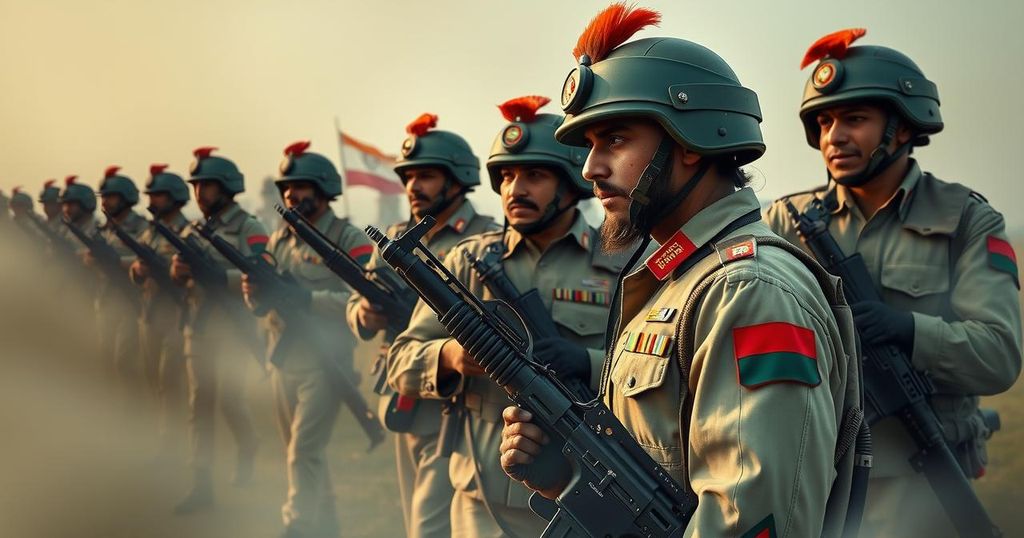Myanmar Conflict: The Arakan Army’s Rise and India’s Strategic Implications

The Arakan Army has emerged as a dominant force in Myanmar’s ongoing civil conflict, gaining control over significant areas in Rakhine province, which raises concerns about a potential influx of Rohingya refugees into Bangladesh. As India closely monitors the situation due to its implications for regional security and its northeastern states, China seeks to expand its influence in Myanmar amidst these tensions. Diplomatic efforts are essential to navigating the complex interactions between the Myanmar military, ethnic groups, and civil society groups.
The ongoing civil war in Myanmar has seen the Arakan Army, the largest ethnic rebel group, gain control of significant territory within Rakhine province. This shift has heightened security concerns along the Bangladesh-Myanmar border, intensifying fears of a potential influx of Rohingya refugees, who are fleeing ongoing violence. The Arakan Army’s ambitions, as part of the anti-junta Three Brotherhood Alliance, underscore the broader struggle for autonomy among various ethnic organizations against the military junta that seized power in a coup in 2021.
The Arakan Army’s recent success, including the strategic capture of the town of Lashio, highlights its growing strength, which has reportedly expanded into areas of Bangladesh, raising tensions with the Bangladesh Army. Analysts note that the group serves as the military arm of the United League of Arakan, representing the interests of the predominantly Buddhist population in the region. For many years, the Rohingya community has faced severe persecution, with the military crackdown in 2017 resulting in a massive humanitarian crisis. Despite the Arakan Army’s claims to represent all ethnic groups in Rakhine, its history is marred by violence against the Rohingyas.
India is closely monitoring the developments in Myanmar due to its implications for regional stability, particularly concerning its northeastern states. The rise of powerful armed groups and drug trafficking across the border poses significant security risks. To mitigate these challenges, India has implemented stricter border controls by limiting free movement along the India-Myanmar border. This measure aims to counter the potential threat of advanced weaponry from Myanmar reaching insurgents in India.
China’s growing influence in Myanmar adds another layer of complexity. It has invested billions in the country’s infrastructure and resources, leveraging relationships with both the junta and insurgent groups, such as the Arakan Army. This engagement threatens to undermine India’s strategic interests, particularly the Kaladan project, aimed at enhancing connectivity between India’s northeast and the Bay of Bengal.
Amidst this tumultuous background, India is adopting a dual engagement strategy, simultaneously interacting with both the rebel groups and the military to safeguard its interests. Experts advocate for dialogue between the conflicting parties to foster a more inclusive and democratic governance structure in Myanmar. This situation remains fluid, and India’s diplomatic efforts are crucial in shaping the future of not only Myanmar but also the stability of the broader region.
Myanmar has been embroiled in civil conflict since the military coup in 2021 that ousted its democratically elected government. Ethnic minority groups, particularly the Arakan Army in Rakhine province, have been fighting for autonomy and control over valuable resources. The Arakan Army is part of the anti-junta Three Brotherhood Alliance, which has recently gained significant territorial control, causing alarm for neighboring countries, particularly Bangladesh, due to fears of increased refugee flows. With complex political dynamics in the region, including China’s strategic engagement with both the Myanmar military and rebel factions, the stability of the region remains precarious and has concerning implications for India’s northeastern states.
The rise of the Arakan Army amidst Myanmar’s ongoing civil war poses significant implications for regional stability. There is a pressing need for diplomatic engagement to address the complex relationship among ethnic armed groups, the military junta, and the Rohingya community. India’s strategic interests are affected by these developments, necessitating a balanced approach to negotiations and aid in fostering democratic governance in Myanmar. The situation requires careful monitoring, as the evolving dynamics may reshape regional security and humanitarian conditions.
Original Source: www.ndtv.com





